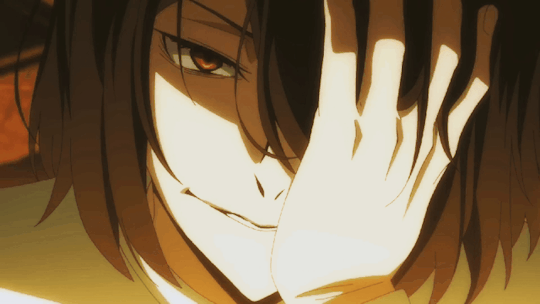#I've been studying this god forsaken language for the majority of my life AND I UNDERSTAND 2 WORDS EVERY 3 SENTENCES
Explore tagged Tumblr posts
Text
currently in france wondering if they really understand each other or if they're just pretending to in order to seem cool
#I've been studying this god forsaken language for the majority of my life AND I UNDERSTAND 2 WORDS EVERY 3 SENTENCES#ils me parlent et je dis oui oui merci pas de problème pas de ah uh oui oui bien sûr merci#et ça c'est seulement une manière pour dire que je n'ai compris rien mais j'ai trop de honte pour dire ça#i love you français mais why does your language have to be like this. mes amours pourquoi. (lisez: i have major stupidity)
0 notes
Text
Fyodor's Last Words in Bungou Stray Dogs
Hello! I know I've been saying I was gonna do this for a long time, and I really did try to find my notes quickly, but I'm here now. This post is meant as a Religious Studies Analysis. As such I would like to state that I was a dual major in Religious Studies and History to qualify myself for this discussion.
I am also going to be writing this post for accessibility, that is to say I am going to assume the reader has little to no knowledge about the New Testament so I will be explaining or giving context to a lot of things, even things that may seem obvious.
What Were Fyodor's Words?

Eli, Eli, Lema Sabachtani which as I'm sure you know is the Arameic version of Christ's cry to God as he was on the Cross in the Book of Matthew. The Book of Matthew is one of the four gospels in the New Testament. The Gospels (which translates to Good News) tell the life story of Jesus.
In the King James Version of the Bible these words are said, "And about the ninth hour Jesus cried with a loud voice, saying, Eli, Eli, lama sabachthani? that is to say, My God, my God, why hast thou forsaken me? (Matthew 27:46)
A disclaimer, I am using the King James Version of the Bible for its importance to the English Language. If you want to see Matthew 27:46 translated differently please check Bible Gateway.
The Significance of Matthew 27:46
Let's talk about the context of Matthew 27:46. Now, this line comes during the Crucifixion of Jesus. This was the ninth hour of Jesus being on the cross, or around 3 in the afternoon, and is said following a period of darkness from noon to three.
Now many scholars and theologians have tried to understand why Jesus would have said God had forsaken him, and this is the same for Fyodor too.
However, I would like to talk about Matthew 27:46 in the context of prophecy. Now, for many Christian scholars the Hebrew Bible (Old Testament) contain several prophecies which Jesus later fulfills. In Psalms 22:1 "Eli, Eli, lama sabachthani?" is said once again. Therefore, a popular interpretation of Matthew 27:46 is that Jesus is emphasizing how his death and eventual resurrection were all proclaimed long ago and fated to happen.
In short: the quote illustrates the prophetic nature of Jesus and how he is the Messiah.
And How Does Fyodor Connect?
Well, I believe that Fyodor's last words were a warning. A warning to Dazai that Fyodor knew he would "die" and come back, just as Jesus did when he said it on the cross. Maybe he planned this all out or views his life as some sort of prophecy to eliminate all ability users.
If we take the quote and apply the Psalms connection to it, it becomes evident that the "sacrifice" Fyodor took was fated to happen and he knew it. He knew he was going to come back, he possibly knew this was going to happen.
Moreover, this quote may also have something to do with his resurrection. Later in Matthew (Matthew 27:50-53), Jesus calls out and an earthquake happens, "and the graves were opened; and many bodies of the saints which slept arose." (Matthew 27:52). Right after Jesus calls out to God, the saints rise from the dead and go to heaven. The quote is intimately tied with resurrection, and I don't think that's a coincidence that Fyodor said it and then comes back. I think Asagiri took this into consideration too.
Most people would think that "My God, my God, why have you forsaken me?" would be a plea of a man caught in a trap with no way out. But, this interpretation does not make sense with Fyodor or his "death". Therefore, understanding Matthew 27:46 has both a line connected with the resurrection of saints and prophecy is crucial to understanding why Fyodor said it during the helicopter crash. He knew he was coming back. I think it was a warning and to illustrate how "ordained by God" his mission is. There's probably more context to add, but it's late and I am sleepy now.
I know this all kinda confirms what we already know, but I think it really illustrates the depth of Fyodor's planning and that he might have known how Mersault was going to go the whole time. Which is terrifying if you think about it.
As always feel free to add things, ask questions, etc. If you disagree just keep it civil. There's probably some things manga wise I didn't add so if you have things to add please do.

#bsd#bsd theory#bungou stray dogs#bungou stray dogs fyodor#bsd fyodor#bsd manga#bsd analysis#bsd religious studies analysis
17 notes
·
View notes